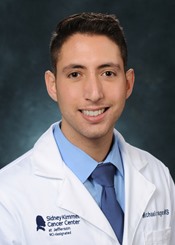Simulating Seed Carrier Resorption to Generate Carrier-Specific TG-43 Tables for Post-Permanent Implant Dosimetry
M Trager*, D Aramburu Nunez, A Damato, G Cohen, Memorial Sloan Kettering Cancer Center, New York, NY
Presentations
PO-GePV-T-57 (Sunday, 7/10/2022) [Eastern Time (GMT-4)]
ePoster Forums
Purpose: Permanent implants of seeds sutured to or embedded in Gelfoam, collagen, or comparable carrier materials have been used for post-resection intraoperative management of tumors, where tumor-bed radio-sterilization can improve overall survival and prolong local control. Material resorption time varies in the literature. Carrier thickness, material, and resorption time impact implant dosimetry and invalidate pre-planned expectations based on TG-43 calculations that assume static implant geometry. Here, we propose that new carrier-specific TG-43 tables for post-implant dosimetry can account for such temporal changes.
Methods: New TG-43 parameters (Λ, g(r), F(r,θ), and along-and-away dose tables) were generated using MatLab. We assumed a 3mm carrier between seeds and tissue is completely resorbed linearly over 18, 30, or 60 days. Total dose per U along-and-away was simulated with a 0.5mm calculation grid and timepoint-resolution matched 0.01cm carrier-thickness resorption. Carrier-specific TG-43 tables were back-calculated from simulated dose and entered in a TPS for evaluation.
Results: Dose distributions calculated with carrier-specific TG-43 tables indicated large deviations from standard TG-43 dose distributions. Largest deviations were experienced at theta>45°, along the seed-motion direction. As carrier resorption time increases and isotope half-life decreases, changes in dosimetry decrease. Test cases with a 5mm thick virtual target volume, 0.3-0.8cm from source plane, resulted in %D90 variations of [154/150/142%], [156/145/130%], and [131/123/117%] for I-125, Pd-103, and Cs-131 for [18/30/60 days], respectively. Larger variations were observed for %D50 and %D10.
Conclusion: Carrier-specific TG-43 tables for permanent implants evaluated on Day-0 imaging, which account for temporal changes in implant geometry due to carrier resorption, are presented. This study’s limitation is lack of consensus data for temporal patterns of carrier-resorption. The dosimetry provided may over/underestimate dose to tissue if resorption time varies. This study provides insight into potential deviations from traditional TG-43 dosimetry for carrier-based implants and may inform analysis of historical or multi-institutional data.
Funding Support, Disclosures, and Conflict of Interest: Memorial Sloan Kettering Cancer Center receives funding from GT Medical Technologies for protocol support.
Keywords
Brachytherapy, Dosimetry, Simulation
Taxonomy
TH- Brachytherapy: Dose optimization and planning
Contact Email



